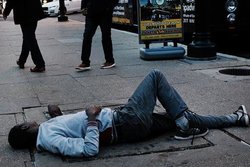 Homelessness is growing in large US cities mainly as a result of rising rent prices, despite a drop in the number of people living on streets across most of the US, a new analysis has found.
Homelessness is growing in large US cities mainly as a result of rising rent prices, despite a drop in the number of people living on streets across most of the US, a new analysis has found. RNA - The incidence of homelessness is growing faster in the least affordable rental housing markets and cities with skyrocketing home prices, including New York City, Los Angeles, San Francisco and Washington, DC, according to the study by Zillow, an online real estate database company.
"It's undoubtedly good news that the overall level of homelessness has fallen nationwide, even as housing costs have increased. But that zoomed-out view obscures some very real, local tensions between housing affordability and homelessness, and ignores the reality that success in tackling homelessness in one community doesn't necessarily have the same effect in another," said Skylar Olsen, director of economic research and outreach at Zillow.
In cities with high housing costs, even a modest rent increase can significantly drive up homelessness, found Zillow, which did the study in collaboration with researchers at the University of New Hampshire, Boston University, and University of Pennsylvania.
In Los Angeles, California’s largest city, a 2 percentage point increase in monthly rent could result in an additional 4,000 people finding themselves on the street, according to the report.
Notably, the rate of homelessness spikes when tenants pay over 32 percent of their income on rent, according to the study.
The rent burden already exceeds that threshold in 100 real estate markets across the US, according to the analysis.
"Before 30 percent, savings are possible, until you go past 32 percent the strength of relationship between rent burden and homelessness gets much stronger," Olsen said.
Some 661,000 people were homeless for some period of time across the country last year, according to the US Department of Housing and Urban Development.
Many Americans find they have to spend above levels that would allow them to save — rent burdens are as high as 63 percent for median market homes in Monroe County, Florida.
The data provide an opportunity to tackle homelessness before it becomes a crisis, the researchers wrote. "These affordability thresholds — along with local poverty rates and the level of rent itself — act as signals for understanding how so many parts of the country can face a homeless crisis, even as the number of people in homelessness nationwide is falling."
847/940